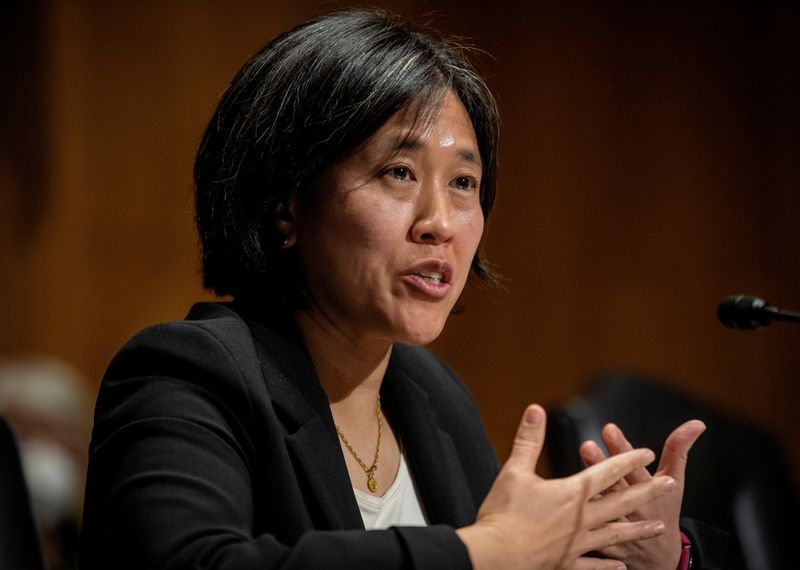
© Reuters. FILE PHOTO: Katherine C. Tai addresses the Senate Finance committee hearings to examine her nomination to be United States Trade Representative, with the rank of Ambassador, in Washington, DC February 25, 2021. Bill O’Leary/Pool via REUTERS/File Photo
By David Lawder
WASHINGTON (Reuters) -The United States has suspended a trade review of Ukraine’s intellectual property practices due to Russia’s invasion and removed oil exporters Saudi Arabia and Kuwait from watch lists due to improvements in their protections of IP rights.
The U.S. Trade Representative’s office said in its annual “Special 301” investigation of trading partners’ intellectual property rights protections that it is keeping China on a Priority Watch List due to concerns raised about the effectiveness of amendments to its patent, copyright and criminal laws enacted last year.
Ukraine had previously been on the USTR’s Priority Watch List — indicating the highest level of concern — due to the use of unlicensed software by Ukrainian government agencies, lack of an effective means to combat widespread online copyright infringements, and concerns about the collection of royalties.
“However, due to Russia’s premeditated and unprovoked further invasion of Ukraine in February 2022, the Special 301 review of Ukraine has been suspended,” USTR said in the report.
USTR also said it had removed Saudi Arabia from its Priority Watch List due to steps the country had taken to publish IP enforcement procedures, improve judicial training in the area, and combat counterfeit and pirated goods and online content.
It said it removed Romania, Kuwait and Lebanon from the lower-priority Watch List due to IP enforcement improvements, but said it would conduct an out-of-cycle review of Bulgaria to assess whether Sofia addresses deficiencies in investigating and prosecuting online piracy cases, “particularly its failure to adopt evidence sampling in criminal cases.”
CHINA CONCERNS
Regarding China, a USTR official said that while U.S. holders of intellectual property rights have welcomed Chinese legal changes enacted last year to meet commitments under then-President Donald Trump’s “Phase 1” U.S.-China trade deal, these companies raised concerns about the “adequacy” of these measures.
The report also said USTR had concerns about statements by Chinese officials emphasizing the importance of intellectual property for China’s drive for market dominance in certain industries and that courts should serve the Chinese Communist Party and the country’s industrial goals.
“Taken together, such statements recall long-standing concerns about requiring and pressuring technology transfer from foreign individuals or companies to Chinese companies, as well as about whether IP protection and enforcement will apply fairly to foreign right-holders in China,” the USTR report said.
U.S. concerns about IP theft and forced transfers of American technology to Chinese competitors for market access were at the heart of the Trump administration’s “Section 301” tariffs on hundreds of billions of dollars of Chinese imports, which have been kept in place by the Biden administration.
USTR said Russia remains on its Priority Watch List due to ongoing challenges, including infringement of copyrights, trademarks and lack of enforcement. However, USTR said that its ability to resolve these issues is “severely limited” due to the war and sanctions imposed on Russia.
“The United States is also closely monitoring recent proposals by Russia to counter international sanctions by allowing uncompensated use of IP held by right-holders based in countries that have sanctioned Russia,” USTR said.
Source: Investing.com









![[Geojit Comtrade] Daily report on Natural Rubber: December 4, 2012](https://img.globalrubbermarkets.com/2024/08/geojit-comtrade-daily-report-on-natural-rubber-december-4-2012.jpg?resize=120%2C86&ssl=1)


















